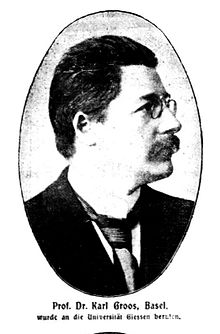Karl Groos
Karl Groos (born December 10, 1861 in Heidelberg , † March 27, 1946 in Tübingen ) was a German philosopher and psychologist .
Life
Karl Groos studied in Heidelberg , where he also became a member of the black fraternity and later fraternity of Vineta Heidelberg . He was a professor in Basel, Giessen and from 1911 to 1929 in Tübingen. One of his students was the philosopher Willy Moog , who received his doctorate from him in Gießen in 1909.
research
Groos mainly worked in the field of developmental and child psychology and formulated a psychological theory of play , which he himself referred to as the practice or self-training theory, according to which play in childhood and adolescence primarily has the biological function of playful preparation for later life tasks Adult met.
Groos undertook statistical studies of literary works. B. found that Schiller's writings contain twice as many acoustic elements of expression as those of Goethe . This procedure was then called “literary psychology”.
In 1938 Groos was elected a member of the Leopoldina .
Fonts
- 1892: Introduction to Aesthetics . Giessen: Ricker.
- 1896: The Games of the Animals . Jena: G. Fischer. (3rd edition 1930)
- 1899: The games of the people . Jena: G. Fischer.
- 1902: The aesthetic pleasure . Giessen: Ricker.
- 1904: The soul life of the child , Berlin: Reuther & Reichardt, several editions
- 1910: The acoustic phenomena in Schiller's poetry . In: Zeitschrift für Ästhetik und Allgemeine Kunstwissenschaft 5, 1910, pages 545-570.
- 1920: Bismarck in his own judgment , Stuttgart 1920
- 1922: The game . Jena: G. Fischer.
literature
- Manfred Hantke: Geistesdämmerung. The philosophical seminar at the Eberhard-Karls-Universität Tübingen 1918–1945. Dissertation, Tübingen 2015, on Karl Groos p. 93 ff .; 121-134 ( online ).
- Franz Weinert : Groos, Karl. In: New German Biography (NDB). Volume 7, Duncker & Humblot, Berlin 1966, ISBN 3-428-00188-5 , p. 130 ( digitized version ).
Another source
Over 100 letters from colleagues, students and friends to Karl Groos in the Psychology History Research Archive (PGFA) of the Distance University in Hagen
Individual evidence
- ↑ Personal collections. In: www.fernuni-hagen.de. Retrieved June 26, 2016 .
| personal data | |
|---|---|
| SURNAME | Groos, Karl |
| BRIEF DESCRIPTION | German philosopher and psychologist |
| DATE OF BIRTH | December 10, 1861 |
| PLACE OF BIRTH | Heidelberg |
| DATE OF DEATH | March 27, 1946 |
| Place of death | Tübingen |
